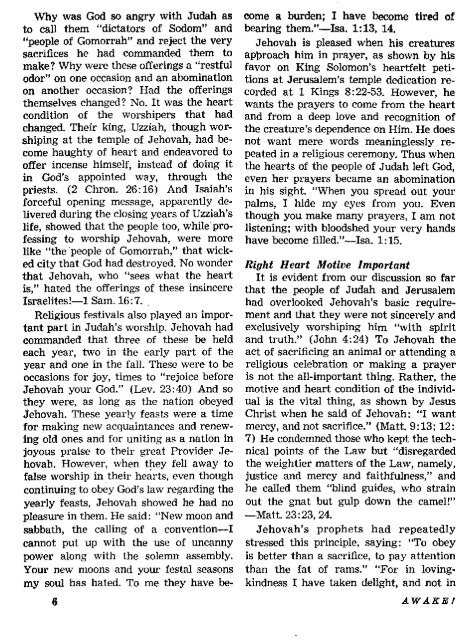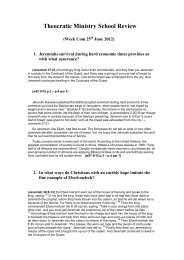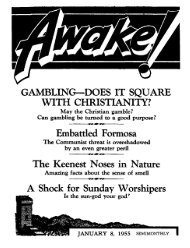1964 Awake! - Theocratic Collector.com
1964 Awake! - Theocratic Collector.com
1964 Awake! - Theocratic Collector.com
You also want an ePaper? Increase the reach of your titles
YUMPU automatically turns print PDFs into web optimized ePapers that Google loves.
Why was God so angry with Judah as<br />
to call them "dictators of Sodom" and<br />
"people of Gomorrah" and reject the very<br />
sacrifices he had <strong>com</strong>manded them to<br />
make? Why were these offerings a "restful<br />
odor" on one occasion and an abomination<br />
on another occasion? Had the offerings<br />
themselves changed? No. It was the heart<br />
condition of the worshipers that had<br />
changed. Their king, Uzziah, though worshiping<br />
at the temple of Jehovah, had be<strong>com</strong>e<br />
haughty of heart and endeavored to<br />
offer incense himself, instead of doing it<br />
in God's appointed way, through the<br />
priests. (2 ehron. 26:16) And Isaiah's<br />
forceful opening message, apparently delivered<br />
during the closing years of Uzziah's<br />
life, showed that the people too, while' professing<br />
to worship Jehovah, were more<br />
like "the 'people of Gomorrah," that wicked<br />
city that God had destroyed. No wonder<br />
that Jehovah, who "sees what the heart<br />
is," hated the offerings of these insincere<br />
Israelites!-l Sam. 16:7.<br />
Religious festivals also played an important<br />
part in Judah's worship. Jehovah had<br />
<strong>com</strong>manded that three of these be held<br />
each year, two in the early part of the<br />
year and one in the fall. These were to be<br />
occasions for joy, times to "rejoice before<br />
Jehovah your God." (Lev. 23:40) And so<br />
they were, as long as the nation obeyed<br />
Jehovah. These yearly feasts were a time<br />
for making new acquaintances and renewing<br />
old ones and for uniting as a nation in<br />
joyous praise to their great Provider Jehovah.<br />
However, when they fell away to<br />
false worship in their hearts, even though<br />
continuing to obey God's law regarding the<br />
yearly feasts, Jehovah showed he had no<br />
pleasure in them. He said: "New moon and<br />
sabbath, the caIling of a convention-I<br />
cannot put up with the use of uncanny<br />
power along with the solemn assembly.<br />
Your new moons and your festal seasons<br />
my soul has hated. To me they have be-<br />
6<br />
<strong>com</strong>e a burden; I have be<strong>com</strong>e tired of<br />
bearing them."-Isa. 1:13, 14.<br />
Jehovah is pleased when his creatures<br />
apllroach him in prayer, as shown by his<br />
favor on King Solomon's heartfelt petitions<br />
at Jerusalem's temple dedication recorded<br />
at 1 Kings 8:22-53. However, he<br />
wants the prayers to <strong>com</strong>e from the heart<br />
and from a deep love and recognition of<br />
the creature's dependence on Him. He does<br />
not want mere words meaninglessly repeated<br />
in a religious ceremony. Thus when<br />
the hearts of the people of Judah left God,<br />
even her prayers became an abomination<br />
in his sight. "When you spread out your<br />
palms, I hide my eyes from you. Even<br />
though you make many prayers, 1 am not<br />
listening; with bloodshed your very hands<br />
have be<strong>com</strong>e filled."-Isa. 1:15.<br />
Right Heart Motive Important<br />
It is evident from our discussion so far<br />
that the people of Judah and Jerusalem<br />
had overlooked Jehovah's basic requirement<br />
and that they were not sincerely and<br />
exclusively worshiping him "with spirit<br />
and truth." (John 4:24) To Jehovah the<br />
act of sacrificing an animal or attending a<br />
religious celebration or making a prayer<br />
is not the all-important thing. Rather, the<br />
motive and heart condition of the individual<br />
is the vital thing, as shown by Jesus<br />
Christ when he said of Jehovah: "1 want<br />
mercy, and not sacrifice." (Matt. 9:13; 12:<br />
7) He condemned those who kept the technical<br />
points of the Law but "disregarded<br />
the weightier matters of the Law, namely,<br />
justice and mercy and faithfulness," and<br />
he called them "blind guides, who strain<br />
out the gnat but gulp down the camel!"<br />
-Matt. 23:23, 24.<br />
Jehovah's prophets had repeatedly<br />
stressed this principle, saying: "To obey<br />
is better than a sacrifice, to pay attention<br />
than the fat of rams." "For in lovingkindness<br />
I have taken delight, and not in<br />
AWAKE!




